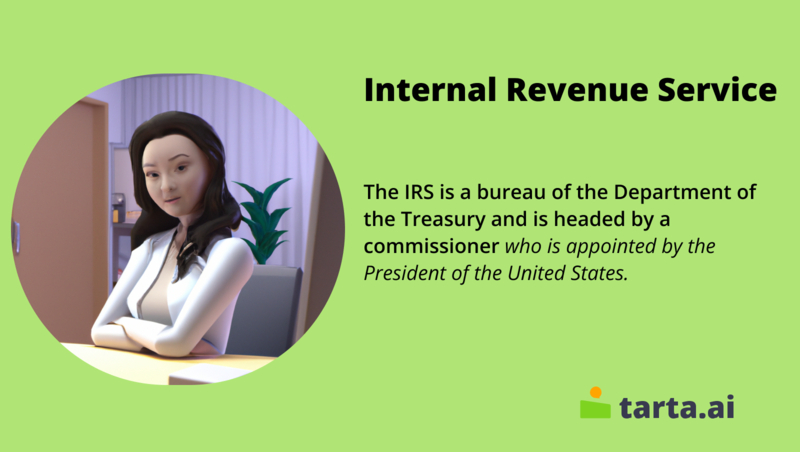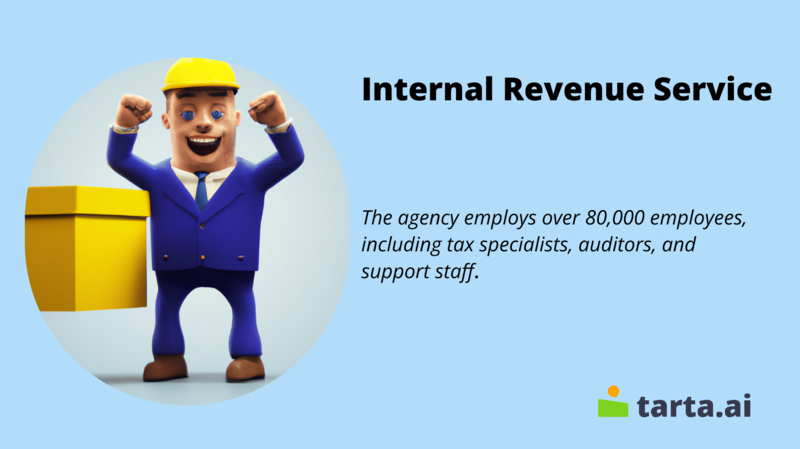Internal Revenue Service (IRS): Services, Organizational Structure, and Criticism

PHOTO: GETTY IMAGES
What is IRS?
The Internal Revenue Service (IRS) is a government agency in the United States responsible for collecting taxes and enforcing tax laws. It was established in 1862 and operates under the Department of the Treasury. The IRS is responsible for processing tax returns, providing assistance to taxpayers, auditing individuals and businesses to ensure compliance with tax laws, and collecting taxes owed to the government. It also oversees the implementation of tax laws and regulations, and investigates and prosecutes cases of tax fraud and other related offenses. The funds collected by the IRS are used to support various government programs and services.
Fact
The IRS is one of the largest financial institutions in the world, with over $3 trillion in annual collections.
An insight into an Internal Revenue Service (IRS) history and development
The history of the Internal Revenue Service (IRS) dates back to the American Civil War. In 1862, President Abraham Lincoln and Congress enacted the Revenue Act, which established the Bureau of Internal Revenue to collect taxes and stamp duties to finance the war effort.
In the years that followed, the Bureau underwent several reorganizations and changes in name, becoming the Internal Revenue Service in 1953. Over time, the IRS's responsibilities expanded to include the collection of all federal taxes, the administration of tax laws and regulations, and the enforcement of tax laws through audits, investigations, and criminal prosecutions.
The IRS has faced various controversies and reforms throughout its history, including allegations of political bias and discrimination, budget cuts, and modernization efforts. Despite these challenges, the IRS remains a critical agency responsible for collecting taxes and ensuring compliance with tax laws in the United States.
Organizational Structure

The organizational structure of the Internal Revenue Service (IRS) is complex and includes several departments and offices. Here is a brief overview of the structure:
- Commissioner: The Commissioner is the highest-ranking official in the IRS and is responsible for overseeing the agency's operations.
- Deputy Commissioner: The Deputy Commissioner assists the Commissioner and oversees the agency's day-to-day operations.
- Chief Counsel: The Chief Counsel provides legal advice and guidance to the IRS on tax matters.
- Wage and Investment Division: This division is responsible for processing tax returns, providing taxpayer services, and collecting taxes from individuals.
- Small Business/Self-Employed Division: This division handles tax issues related to small businesses and self-employed individuals.
- Large Business and International Division: This division handles tax issues related to large corporations and multinational companies.
- Tax Exempt and Government Entities Division: This division handles tax issues related to tax-exempt organizations, government entities, and employee retirement plans.
- Criminal Investigation Division: This division is responsible for investigating and prosecuting criminal violations of the tax code.
- Appeals Division: This division provides an independent appeals process for taxpayers who disagree with the IRS's decisions.
- Office of Professional Responsibility: This office is responsible for enforcing ethical standards for tax professionals.
- Office of Chief Information Officer: This office oversees the IRS's information technology systems and infrastructure.
- Office of Communications: This office is responsible for communicating with taxpayers, the media, and other stakeholders.
Each of these departments and offices has its own specific responsibilities and functions within the IRS's overall structure.
Did you know?
The agency is also responsible for administering the Affordable Care Act (ACA), which includes enforcing the individual mandate and administering tax credits for individuals and small businesses.
What services does Internal Revenue Service (IRS) provide?
The Internal Revenue Service (IRS) provides a variety of services to taxpayers in the United States, including:
- Tax preparation assistance: The IRS provides resources and tools to help individuals and businesses prepare and file their tax returns.
- Taxpayer education: The IRS offers educational materials and programs to help taxpayers understand their tax obligations and how to comply with tax laws.
- Taxpayer assistance: The IRS provides customer service and assistance to taxpayers who have questions or need help with their tax issues.
- Collection of taxes: The IRS is responsible for collecting taxes owed to the government from individuals and businesses.
- Enforcement of tax laws: The IRS enforces tax laws through audits, investigations, and criminal prosecutions of individuals and businesses that violate tax laws.
- Issuance of tax refunds: The IRS processes tax returns and issues refunds to taxpayers who overpaid their taxes.
- Taxpayer data protection: The IRS works to protect taxpayers' personal and financial information from identity theft and other forms of fraud.
- Implementation of tax laws and regulations: The IRS is responsible for implementing and enforcing tax laws and regulations passed by Congress and signed into law by the President.
Overall, the IRS's services are aimed at ensuring compliance with tax laws, collecting taxes owed to the government, and providing assistance and education to taxpayers.
What are taxpayer rights when they deal with The Internal Revenue Service (IRS)?
Taxpayers in the United States have several rights when dealing with the Internal Revenue Service (IRS). These rights include:
- The right to be informed: Taxpayers have the right to receive clear explanations of the tax laws and procedures from the IRS.
- The right to quality service: Taxpayers have the right to receive prompt, courteous, and professional assistance from the IRS.
- The right to pay no more than the correct amount of tax: Taxpayers have the right to pay only the amount of tax they legally owe, and to have the IRS apply all tax payments properly.
- The right to challenge the IRS's position: Taxpayers have the right to object to an IRS decision and provide additional documentation or information to support their position.
- The right to appeal an IRS decision: Taxpayers have the right to appeal most IRS decisions in an independent forum.
- The right to finality: Taxpayers have the right to know the maximum amount of time they have to challenge the IRS's position and to receive a timely and final resolution of their case.
- The right to privacy: Taxpayers have the right to expect that any information they provide to the IRS will be kept confidential.
- The right to confidentiality: Taxpayers have the right to expect that any information they provide to the IRS will be used only for tax administration purposes.
These rights are outlined in the Taxpayer Bill of Rights, which was enacted by Congress in 2015 to ensure that taxpayers are treated fairly and with respect when dealing with the IRS.

Criticism of The Internal Revenue Service (IRS)
- The complexity of the tax code: Many people criticize the IRS for the complexity of the tax code, which they argue makes it difficult for taxpayers to understand and comply with tax laws.
- Inconsistent enforcement: Some people criticize the IRS for inconsistent enforcement of tax laws, arguing that the agency may be more lenient or more aggressive in its treatment of certain taxpayers or industries.
- Poor customer service: Some taxpayers have complained about poor customer service from the IRS, including long wait times on the phone, difficulty getting through to a representative, and inconsistent or incorrect information provided by IRS staff.
- Lack of accountability: Some critics argue that the IRS lacks sufficient accountability to taxpayers and that the agency may be too easily influenced by political pressures or special interests.
- Data security issues: In recent years, the IRS has faced criticism for data security issues, including breaches of taxpayer data and vulnerabilities in the agency's information technology systems.
- Underfunding: Some people argue that the IRS is underfunded and understaffed, which makes it difficult for the agency to carry out its responsibilities effectively.
Are there any tax scams connected with The Internal Revenue Service (IRS)?
Unfortunately, there are many tax scams that are connected with the Internal Revenue Service (IRS). These scams can take various forms and are often designed to trick taxpayers into giving away their personal information or money.
Here are some examples of common tax scams:
- Phishing scams: Scammers send emails or make phone calls pretending to be the IRS and ask for personal information or payment. They may threaten legal action or arrest if the victim does not comply.
- Identity theft: Scammers use stolen Social Security numbers or other personal information to file fraudulent tax returns and claim refunds.
- Preparer fraud: Some tax preparers may promise large refunds or offer to falsify information on tax returns in exchange for a fee.
- Charity scams: Scammers may use fake charities to solicit donations, claiming that the donations are tax-deductible.
- Offshore tax scams: Scammers may offer to help taxpayers hide income or assets offshore to avoid paying taxes.
It's important to be vigilant and to protect your personal information. The IRS will never call or email you to ask for personal information or payment, and they will always send written correspondence before taking any legal action. If you receive a suspicious communication, you can report it to the IRS.
- The IRS is a government agency responsible for collecting taxes and enforcing tax laws in the United States.
- Filing a tax return is required by law, and failure to file or pay taxes can result in penalties or legal action.
- The IRS offers various tools and resources to help taxpayers understand and comply with tax laws, including free tax preparation assistance for eligible taxpayers.
- Tax scams are a real threat and taxpayers should be vigilant about protecting their personal information and reporting any suspicious activity to the IRS.
- Working with a qualified tax professional can help ensure that you are filing your taxes correctly and taking advantage of all available deductions and credits.
FAQ
What is the deadline for filing federal income tax returns with the IRS?
The deadline for filing federal income tax returns is typically April 15th, but it can be extended to October 15th if the taxpayer files for an extension.
What is the penalty for failing to file a tax return with the IRS?
The penalty for failing to file a tax return can be up to 5% of the unpaid tax amount per month, up to a maximum of 25%.
Can the IRS garnish wages or seize assets to collect unpaid taxes?
Yes, the IRS has the authority to garnish wages, seize assets, and place liens on property to collect unpaid taxes.
What is the Earned Income Tax Credit (EITC) and how can I claim it on my tax return?
The EITC is a tax credit for low- to moderate-income working individuals and families. To claim the EITC, you must meet certain income and eligibility requirements and file a tax return.
Can I file my taxes electronically with the IRS?
Yes, taxpayers can file their taxes electronically using the IRS's Free File program, which offers free tax preparation software for eligible taxpayers. Many tax professionals also offer electronic filing services.